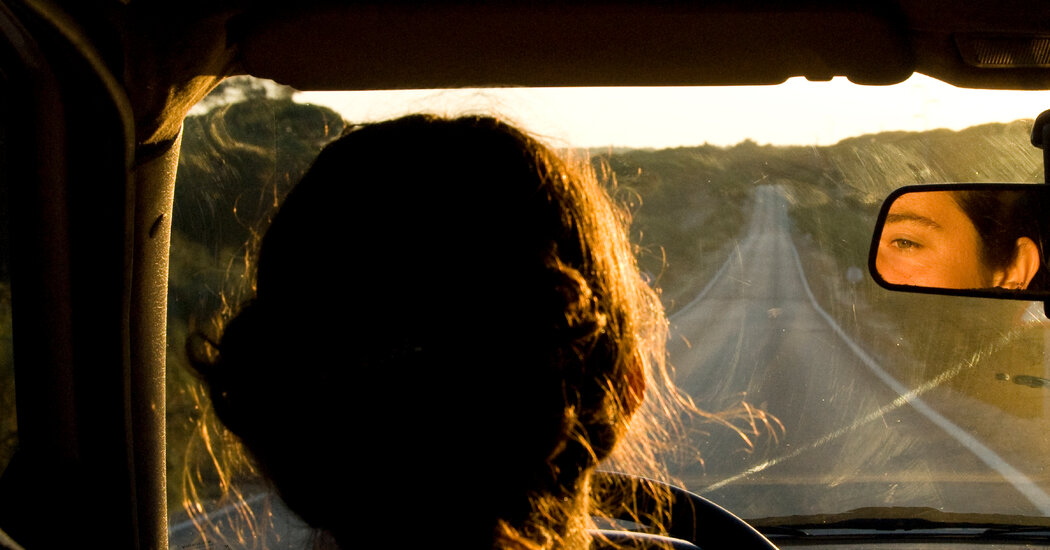BAD NATURE, by Ariel Courage
For many people, being diagnosed with terminal cancer at the age of 40 might prompt an instant reassessment of priorities. For Hester, the narrator of Ariel Courage’s debut novel, “Bad Nature,” this means immediately quitting her job in Manhattan to drive across the country and murder her father.
It’s the sole item on her bucket list, and it’s also unfinished business: Her first attempt, at 13, when she shot him with a BB gun to stop him from abusing her mother, coincided with his permanent exit from their household. Since then, their relationship has consisted of Hester checking the internet now and then “to confirm he was alive and therefore still killable.” Think of “Bad Nature” as the anti “Eat, Pray, Love.”
Personal-crisis travel narratives by white women, both memoirs and fiction, tend to follow certain conventions: protagonists embarking on journeys of earnest, emotional introspection in response to devastating news. These women tend not to be jerks. Hester — a lawyer who spends her days negotiating settlements for her conglomerate employer’s E.P.A. violations — runs right over these expectations with her Jaguar E-Type, then throws the car in reverse to do it again.
Putting an unlikable heroine in the (literal) driver’s seat of a debut is an admirable feat, and Courage pulls it off through her character’s ruthless self-awareness, acerbic humor and one-liners so hilarious it’s tempting to read them aloud. “I wondered what my tumor was up to,” she thinks. “My breast was such an inhospitable place, meager and thin. I pictured my tumor like a goat on a cliff’s face, hunting for roughage to gnaw on. You almost had to root for it, the underdog. I called it Beryl.”
Over the course of her journey — which quickly strays from the linear path she’s planned — Hester is not immune to personal growth, but “Bad Nature” is refreshingly more interested in social critique — particularly of American individualism and its harm to the collective good. Before she’s even left New York she’s already picked up a hitchhiker named John, a radical environmentalist (and sometimes eco-terrorist) whose current mission involves breaking into government “cleanup” sites and documenting their chemical damage via artistic photographs.
Guiding Hester to several of these sites along her westward route, John becomes an unlikely but convincing foil to her amoral, fur-wearing consumerism: He’s “a species of ethical genius” who shuns materialism, shows interpersonal care and has an encyclopedic knowledge about the environmental impact of every human action, from drinking coffee to shooting someone. John challenges Hester’s long-held yet barely examined values by forcing her to confront the tangible fallout of the same kind of work that made her wealthy — and its link to terminal illnesses like her own.
At times we have to root for Hester, too: a “prickly and standoffish” (her words) corporate powerhouse who hasn’t had a friend since high school and who would rather catch chlamydia than feelings. “I had a policy of jettisoning any man I dated around week six,” she says early on, and sleeping with “a lot of borderline-grotesque strangers in between.”
But through Hester’s flashbacks to her earlier life, Courage skillfully illuminates the source of her “bad nature”: a traumatic upbringing mired in poverty and her father’s physical abuse. It becomes clear that her commitment to such a patriarchal model of success — shunning emotional development and personal connection in favor of amassing wealth in morally deplorable ways — is a means of protecting herself from her own childhood suffering. “I thought everyone eventually grew up to want the kind of money that would enable them to escape their past,” she thinks. In other words, to avoid being a victim, Hester uses the oldest trick in the book: Become a villain instead.
It works until it doesn’t, when only John is able to get close enough to Hester to diagnose the one secret she tries to guard even from herself: She’s lonely.
It’s a particularly painful truth to handle while readying to die. Among her coping strategies is calling her oncologist from pay phones along her journey; to heckle him, or accuse him of malpractice, or deliver an epiphany regarding lead-coated creek beds on Quapaw land in Oklahoma. “Do you think I’d be like this if the world didn’t make it so easy?” she desperately, almost manically asks the doctor. “Was I always going to be like this?” He responds by imploring her to call 911.
It is easy, living in America, to be poisoned — physically and ethically. To suffer abuse, and then to perpetuate the cycle of harm. To chase wealth with little regard for the cost. But “Bad Nature” shows we’re getting selfishness all wrong. As uproariously funny as a takedown of our deadly society can be, the novel is also an urgent call to exchange possession for belonging. Hester is proof that, eventually, capitalism destroys even those it seems to benefit most.
BAD NATURE | By Ariel Courage | Holt | 290 pp. | $28.99
